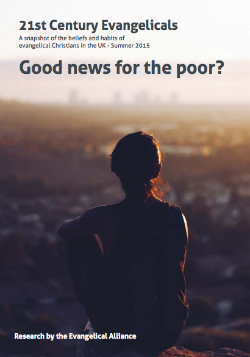New government must do more to tackle poverty
Evangelicals have issued a stinging critique of the last government’s economic policy in new research from the Evangelical Alliance.
 The Good news for the poor? report shows nearly four out of five evangelicals thought the last government’s economic policy hurt the poor more than the rich, while two thirds said welfare reform policies had a negative impact on the sick and disabled. Overall, just 15 per cent of evangelicals said the Coalition’s economic policy worked well to produce a more prosperous future for all.
The Good news for the poor? report shows nearly four out of five evangelicals thought the last government’s economic policy hurt the poor more than the rich, while two thirds said welfare reform policies had a negative impact on the sick and disabled. Overall, just 15 per cent of evangelicals said the Coalition’s economic policy worked well to produce a more prosperous future for all.
The research shows a very high level of concern about poverty among evangelicals. This is motivated by a belief that God is on the side of the poor and this leads evangelical Christians to support a more generous welfare budget. Further findings include:
-
97 per cent believe the Bible teaches we should work for justice for the poor
-
86 per cent agree we will be judged harshly if we neglect to care for the poor
-
28 per cent think the welfare budget is too low (compared to 15 per cent of the UK population)
-
22 per cent think the welfare budget is too high (compared to 46 per cent)
-
46 per cent, think that cutting welfare benefits is not a good way to tackle poverty, only 21 per cent consider it an effective response
When it comes to tackling poverty, evangelical Christians back a range of measures and government redistribution of wealth only just squeezes into the top 10, with a fairer and more generous benefit system even lower. Many more evangelicals consider getting a good education as the best route out of poverty, with strong businesses providing employment; debt advice and money management courses; and preventing family break-up, also ranking highly.
Commenting on the report’s release Dr Dave Landrum, director of advocacy at the Evangelical Alliance, said: 'Evangelicals are active in tackling poverty and they’re disappointed at the record of the government over the past five years. As ever, we’re committed to working with charities and local government to help those in our neediest neighbourhoods.
'We want to see a society that provides opportunities for people to work and to have access to the education and training necessary to be able to avoid or escape poverty.
'The government not only needs to value and support the work of churches, it also has a responsibility to make sure that poverty decreases and doesn’t increase in the next five years.'
On an individual level, evangelical Christians are highly active in tackling poverty with seven out of 10 having donated to a food bank in the last year. Nearly four in 10 are also volunteering for a local Christian project tackling poverty. However, only one in 10 have shared a meal in their home with someone who was hungry, destitute or homeless.
Founder and international director of Christians Against Poverty (CAP) John Kirkby said: 'Just this week, we’ve had 31 representatives from churches across the UK with us to be trained to open, grow and maintain CAP debt centres. We know poverty is a huge concern for the Church and we’d warmly welcome any MP – new or re-elected - who wants to learn more about our work and about the people we help.'
Gordon Gill, director of marketing and ministry at Prospects, said: 'Government estimates suggest there are 1.5 million people living in the UK with learning disabilities; put another way, 1.5 million families affected by learning disability.
'We know financial hardship is very real for these families as parents, out of necessity, leave full-time employment to take on a lifetime caring role. For these families, the support they desperately need is more than financial. Last year 252 volunteers from 88 local churches attended Prospects training events to open support groups for families affected by learning disability.'
Baptist Times, 31/05/2015